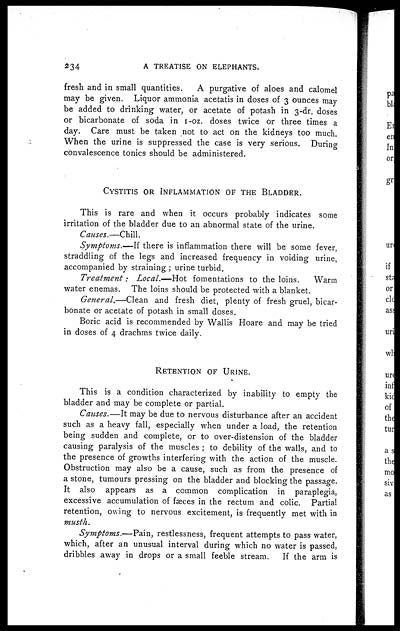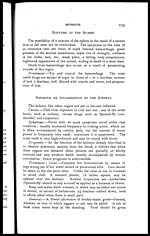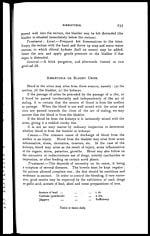Medicine - Veterinary > Veterinary diseases > Elephants and their diseases > Part IV - Non-infective diseases
(290) Page 234
Download files
Individual page:
Thumbnail gallery: Grid view | List view

234 A TREATISE ON ELEPHANTS.
fresh and in small quantities. A purgative of aloes and calomel
may be given. Liquor ammonia acetatis in doses of 3 ounces may
be added to drinking water, or acetate of potash in 3-dr. doses
or bicarbonate of soda in 1-oz. doses twice or three times a
day. Care must be taken not to act on the kidneys too much.
When the urine is suppressed the case is very serious. During
convalescence tonics should be administered.
CYSTITIS OR INFLAMMATION OF THE BLADEER.
This is rare and when it occurs probably indicates some
irritation of the bladder due to an abnormal state of the urine.
Causes.—Chill.
Symptoms.—If there is inflammation there will be some fever,
straddling of the legs and increased frequency in voiding urine,
accompanied by straining ; urine turbid.
Treatment: Local.—Hot fomentations to the loins. Warm
water enemas. The loins should be protected with a blanket.
General.—Clean and fresh diet, plenty of fresh gruel, bicar-
bonate or acetate of potash in small doses.
Boric acid is recommended by Wallis Hoare and may be tried
in doses of 4 drachms twice daily.
RETENTION OF URINE.
This is a condition characterized by inability to empty the
bladder and may be complete or partial.
Causes.—It may be due to nervous disturbance after an accident
such as a heavy fall, especially when under a load, the retention
being sudden and complete, or to over-distension of the bladder
causing paralysis of the muscles ; to debility of the walls, and to
the presence of growths interfering with the action of the muscle.
Obstruction may also be a cause, such as from the presence of
a stone, tumours pressing on the bladder and blocking the passage.
It also appears as a common complication in paraplegia,
excessive accumulation of faeces in the rectum and colic. Partial
retention, owing to nervous excitement, is frequently met with in
musth.
Symptoms.—Pain, restlessness, frequent attempts to pass water,
which, after an unusual interval during which no water is passed,
dribbles away in drops or a small feeble stream. If the arm is
Set display mode to: Large image | Zoom image | Transcription
Images and transcriptions on this page, including medium image downloads, may be used under the Creative Commons Attribution 4.0 International Licence unless otherwise stated. ![]()
| India Papers > Medicine - Veterinary > Veterinary diseases > Elephants and their diseases > Non-infective diseases > (290) Page 234 |
|---|
| Permanent URL | https://digital.nls.uk/75192930 |
|---|




